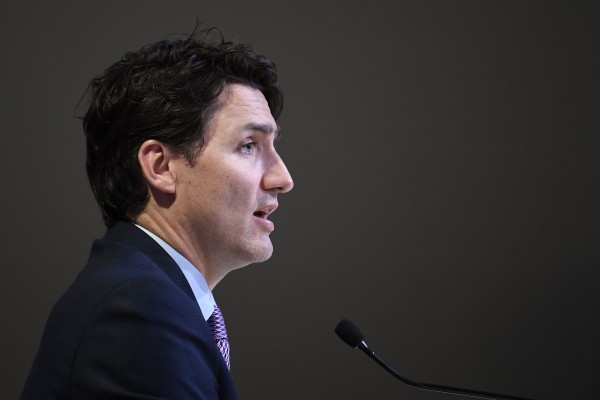Canadian democracy in ‘advanced disrepair,’ claims Coyne
A veteran columnist’s dire diagnosis of Parliament’s decay makes for a sharp critique—if not a fully convincing case

Photo by Iouri Goussev/Flickr
A long-standing maxim in the newspaper business holds that the longer you spend as a journalist, the more jaded and cynical you become. You get to peek inside the corridors of power and can’t help but notice the wide difference between appearance and reality. Soon your jaded view of reality comes to colour your perceptions. As a high-profile columnist for national newspapers since 1985, first for the Financial Post and most recently for the Globe and Mail, Andrew Coyne may have succumbed to this syndrome, judging by his new book The Crisis of Canadian Democracy. Reading like a critical political science textbook, it is a collection of complaints about our system of federal government which add up to less of a mountain than a series of molehills that fails to support his dire conclusions. “The very notion of Canadians as a self-governing people is dissolving before our eyes,” claims Coyne. “Parliament is mostly a waste of time in its present form.” Many of his complaints seem picayune, and Coyne attempts to add them up to much more than the sum of their parts. “Far from a democratic example to the world, our parliamentary system is in a state of advanced disrepair—so advanced it is debatable whether it should still be called a democracy,” he writes. “The plain truth is that none of the institutions of our democracy work as intended, or as we imagine they do, or as they used to, or as they do elsewhere. Some are best described as having ceased to work at all. The rot has set in at every level, from the corrupt and chaotic process by which the parties choose their candidates and leaders, to the sordid fraternity hazings that are modern election campaigns.”
Such is his skill in the dark arts of persuasion that Coyne first cannily inoculates his reader against evidence that contradicts his argument, in this case surveys that consistently place Canada among the world’s healthiest democracies. He freely admits that Freedom House ranked us fifth in its annual Freedom in the World report, with a score of 39/40 for political rights, and the Economist Intelligence Unit ranked us 13th in its latest Democracy Index, one of only two dozen “full” democracies in the world. “This is true, and worth celebrating,” he concedes. “By many of the usual measures Canada is indeed an exemplary democracy… But we are not a fully functioning democracy.” Coyne’s main complaint is that the powers of Parliament have become overly centralized in the hands of our prime minister. “The government does not answer to the Commons so much as the Commons answers to the government.” MPs and even cabinet ministers, he argues, have been reduced to mere figureheads. “The Cabinet is not where most key decisions are made: that place is now the Prime Minister’s Office,” he writes. “Ministers have no serious role in the management of the departments to which their names are attached—that is entirely devolved to their deputy ministers.” The emasculation of cabinet ministers, he claims, has resulted in large part from the recent practice of the PMO appointing not only their deputy ministers but also their chiefs of staff. “You read that right: ministers of the Crown in Canada are no longer allowed to choose their own chief of staff, the person with whom they must work more closely more than any other, and on whose advice—and loyalty—they must rely. In Canada, that person answers not to the minister, but to the Prime Minister’s Office. In effect, the PMO has an agent planted in every minister’s office, acting as its eyes and ears.” The PMO has grown in size to match its overweening power, now employing more than 120 staff, or 10 times that of the average minister’s office. “The number of civil servants reporting directly to a Canadian prime minister dwarfs the numbers available to other prime ministers,” notes Coyne. “Combined, the number of [civil servants and political staff] in the Prime Minister’s Office or in his ‘department,’ is 80 percent larger than that of second-place Germany, a country with twice the population.” Government MPs “have become foot servants to the PM” under this system, complains Coyne, while cabinet ministers have been reduced to mere “courtiers.”
As if stripping them of their power wasn’t enough, the chain of command to which cabinet ministers now report is truly humiliating. “What must be particularly galling for ministers is that it is not the prime minister, these days, from whom they are obliged to take instructions, and to whom they are obliged to address their every request. It is the prime minister’s officials, the ‘kids in short pants,’ as they are often called. It is one thing to be big-footed by the prime minister, who is, after all, elected. But who elected the kids?” The centralization of power in the hands of our prime ministers has had a corrupting effect, according to Coyne. “Power amassed is power abused,” he argues. “It is no coincidence that so many of our prime ministers have become corrupted by the office—I can think of at least two in my lifetime who should probably have ended up behind bars.”
Coyne’s long list of complaints also includes the rigid system of party discipline that requires MPs to vote the party line. “Members of Parliament have little role or responsibility left to them but to stand up and sit down when they are told.” The extent of control over MPs even extends to what they can and cannot say. “MPs cannot ask questions in the House, or make members’ statements, without the permission of party officials—and when they do, are as often as not confined to reading out lines written for them by party communications staff.” Debate in Parliament is routinely cut short in the ever-fewer days it now sits, while Question Period has become a frenzied circus. “The absurd time limits on both questions and answers—just thirty-five seconds for each—adds to the frenetic air: where the UK and Australian equivalents of Question Period run to about twenty questions a day, it is not uncommon to see Canadian parliamentarians rip through more than forty.” While the House of Commons used to sit for about 150 days a year, much the same as its British, French and American counterparts, that number has fallen over the last three decades by nearly a third to 112 days on average. “Our MPs are obliged to show up fewer than one calendar day in three.” Omnibus bills larded with all manner of pet projects and pork, as are common in the US and exemplified by Trump’s “Big Beautiful Bill,” which was recently passed, are “a uniquely Canadian ill” among Westminster democracies, notes Coyne. Britain and Australia prohibit them, New Zealand limits them, as do countries including France, Germany and Italy.
Then there are prime ministerial appointments, which Coyne notes are made almost entirely without independent oversight. “In other countries, appointments to the executive are generally subject to independent scrutiny, whether by political or non-political officials. The United States, for example requires all important presidential appointments, more than 1,200 in all, to be confirmed by the Senate.” Our Senate, which Coyne derides as “the House of Ill Repute,” is a particular subject of his scorn. “Senators have been chosen, historically, with a partisanship that verges on the hysteric: out of 860 appointees to the Senate from 1867 to 2015, fully 832, or 97 percent of the total, took their seats as representatives of the prime minister’s party… To call it a patronage house is an insult to patronage.” While it once served up sober second thought, he claims that the Senate now exists to simply rubber stamp legislation. “From 1867 to 1945, the Senate killed a total of one hundred twenty-five bills sent up to it by the Commons,” notes Coyne. “Since 1945, a mere handful of bills passed by the Commons have been defeated in the upper house.” That could change in a partisan Senate overwhelmingly appointed by Liberal governments over the past decade if and when the Conservatives ever regain power. “There is a real potential for crisis,” warns Coyne. “The Senate is an accident waiting to happen: an accident with the potential to do great harm.”
Coyne’s list of complaints goes on and on, and some are among the oldest in the book. “Recent Canadian elections have set new standards for dishonesty: not just the usual calculated ambiguity, but flat-out lies,” he carps. “Parties routinely campaign on one thing and do the precise opposite once in power.” A culture of lying has “overtaken our politics,” claims Coyne, as mendacity has become so accepted that it is now engrained in our system of politics. “Lying to the public has become an accepted stratagem in Canadian politics, all part of the game, like fighting in hockey.” Then there is the unequal representation brought by the way our ridings are drawn. “It takes as many votes to elect one Tory MP in some Alberta ridings as it takes to elect six Liberal MPs in PEI and Labrador. In effect, the votes of some citizens are worth five times, or ten times, or twenty times as much as another’s, depending on which party they were cast for and in which riding.”
Luckily Coyne also offers a few solutions, like cutting the number of cabinet ministers in half to increase their power. “At nearly forty ministers, counting the prime minister, the current edition is among the largest in our history—the largest, in fact, in the developed world, and more than twice the average of other OECD countries.” His other suggestions include more oversight of prime ministerial appointments, replacing the “fun-house distortions” of our first-past-the-post electoral system with a system of proportional representation and making voting mandatory to increase turnout.
Coyne’s complaints add up to rather thin gruel in the grand scheme of things, but his acerbic way with words at least makes them into an entertaining and informative read.
Marc Edge teaches Communication at University Canada West in Vancouver. His books and research on Canadian media can be found online at www.marcedge.com.










